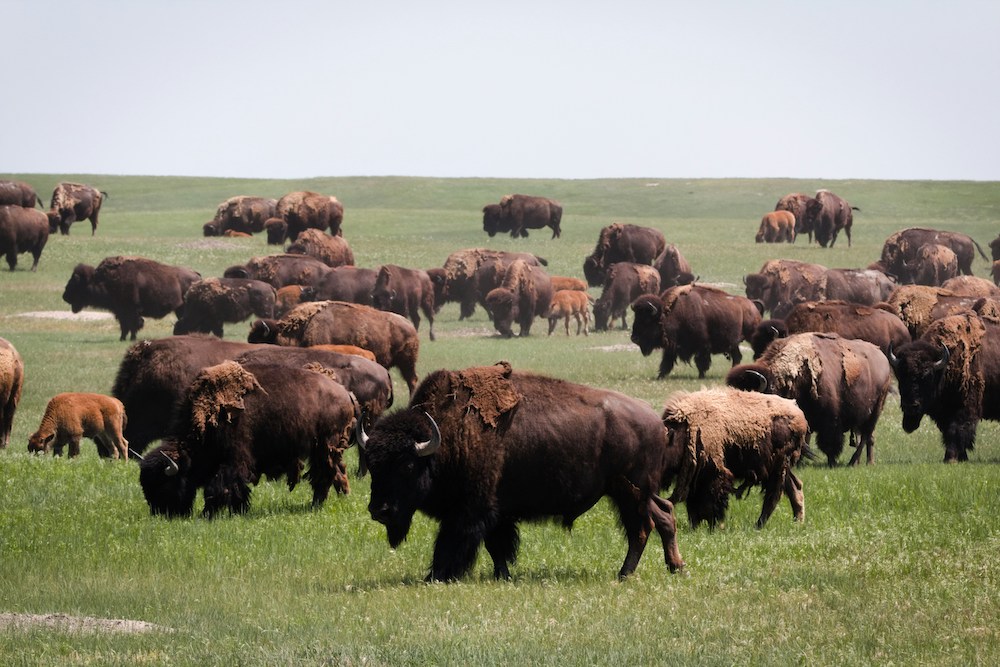
- Details
- By Chez Oxendine
- Food | Agriculture
A Native-led nonprofit in New Mexico nonprofit will distribute more than $1 million in federal grants to tribes and tribal organizations for bison production projects.
The Flower Hill Institute, based in Jemez Pueblo, N.M., received $1.14 million through the U.S. Department of Agriculture’s Bison Production and Marketing Grant Program, which awarded a total of $3.38 million to three organizations in September. The National Bison Association and Mad Agriculture, both based in Colorado, also received funds to distribute. Flower Hill was the sole Native-led organization among the three recipients.
Flower Hill plans to issue roughly six subgrants ranging from $50,000 to $150,000 for projects that expand bison production, reduce waste and build long-term capacity in Native agriculture. The institute is still developing application criteria and timing for the program, coordinating with the other two grant recipients to maximize impact across the bison industry.
“We’re determining how all three of us that received the grant funding are going to coordinate it,” said Dave Carter, regional technical assistance director at Flower Hill Institute. “It’s not a large grant, so we want to make sure we’re working together so we are maximizing the resources we can get out there.”
Flower Hill will direct 80% of its funds to subawardees, with 20% reserved for program oversight. The program supports three areas: business support and consulting, product innovation and training, and education and information dissemination, according to Harleigh Moore-Wilson, director of agriculture at Flower Hill Institute and project investigator for the bison grant.
Moore-Wilson said the program encourages whole-animal utilization and aims to reduce waste from processing. One example could be diverting hides from landfills to leather manufacturers, or repurposing rib bones for cultural uses such as Indian dice. Moore-Wilson said the organization wants to give participants room to suggest new ideas rather than limiting the scope prematurely.
The project includes a knowledge-sharing component. Each project will present its results in a webinar hosted by the institute, with recordings archived in a free online library.
The effort is part of Flower Hill’s broader work to address gaps identified in a Rockefeller Foundation–supported needs assessment of Midwest tribal food systems, which found widespread shortages in infrastructure, labor and stable funding.
The report identified infrastructure and labor as the most pressing bottlenecks for tribal food systems. According to the survey, 65% of respondents reported lacking access to processing facilities, 57% lacked sufficient irrigation and 52% lacked cold storage. Around 74% cited labor as a major challenge.
Federal funding volatility was another barrier. Two-thirds of respondents reported negative impacts from recent changes in federal or state funding, including delays, cancellations, and bureaucratic uncertainty.
The needs assessment found most tribal food programs prioritize feeding elders, youth and households. While some mature operations report increasing self-sufficiency, most still require consistent outside funding to sustain their programs.
The report concluded that philanthropy and federal funding can play a catalytic role in strengthening Indigenous food systems across the Midwest. Recommendations included supporting intertribal collaboration, investing in infrastructure, providing flexible operating support, buffering public funding volatility, pairing funding with culturally responsive technical assistance and expanding market access for tribally produced items, including bison meat and other products associated with the animal.
“This grant can help us work with tribes and others to make sure that there’s the opportunity to bring more of the bison production back, which in turn can help bring that cultural and economic development back,” Carter said. “It lets us put bison back at the center of a food system that helps address those issues in tribal nations.”
